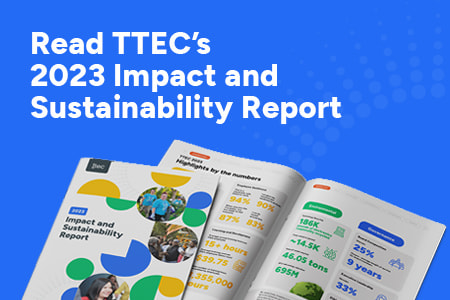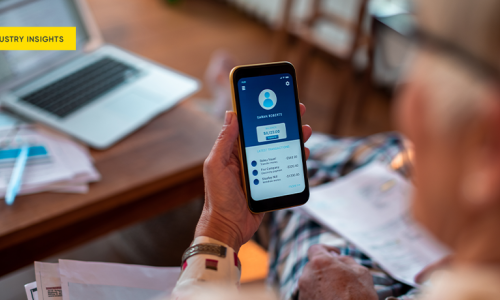The years of rapid growth in the mobile telecommunications market in the United States are history. Mobile penetration, measured by the number of mobile phone subscribers per 100 inhabitants, crossed the 100 percent mark in the third quarter of 2011 and is forecast to be stable at about 104 percent through 2015.1 The compound annual growth rate of consumption volume is anticipated to decline to 2.3 percent through 2015.2
In this slow-growth environment, retaining existing customers and acquiring additional customers from the competition are paramount objectives. Unfortunately, mobile service providers are generally not doing well at the former and are paying a steep price to achieve the latter. Annual churn rates among the largest mobile service providers range from 16.4 percent to 52.6 percent,3 and the average cost to acquire a new customer is $350 to $400.4 Fighting the battle through clever advertising and promotions, discount pricing, and new handset introductions is an activity in which all mobile service providers are engaged—and, as a consequence, the effectiveness of these activities is diluted and the impact is transitory. There must be something more that can be done to win customer commitment and loyalty and to secure customer advocacy.
Based on research conducted by Peppers & Rogers Group,5 there is a new path to ponder, namely, concentrating on building a foundation of customer trust, by identifying and improving upon those experiences that are most salient in enhancing that trust.
In describing these empirical insights, consideration will first be given to several classes of customer experiences and how mobile service providers' performance in delivering those experiences impacts trust; second, to the emotions that are engendered by those experiences and their association with trust; third, to a closer look at trust in the mobile services industry; and finally, to the heightened level of business outcomes driven by higher levels of customers' trust.
Customers' Experiences
Customers have a variety of experiences with their mobile service provider across many dimensions, five of which are examined in this research: network, plans, and devices; communications to the customer; communications from the customer; retail stores; and brand.
For each of these five dimensions, we examined several specific facets of customers' experiences and, for each facet, the extent to which a provider's success in delivering a low- or high-quality experience influences the degree to which trust is created (or destroyed) is quantified.
1. Network, plans, and devices
A customer will not trust a mobile service provider that fails to deliver the basics consistently well. More aspirational assertions by a mobile service provider about itself ring hollow when the foundational products and services fail to meet expectations.
Specifically, when customers' experiences6 with the mobile network, plans, or devices are judged to be substandard, the level of trust7 placed in the provider suffers. To understand these impacts, consider the trust multiplier for a performance attribute, defined as the ratio of the amount of trust garnered by those customers for whom the mobile service provider's performance is high as compared to those for whom it is low. For example, as illustrated in Figure 1, customers who experience their mobile service provider's network as highly stable rate the trust of that provider at 8.3 on a 0–10 scale, whereas those who disagree that the network is stable rate the provider's trust at 3.1. The ratio of those two trust ratings (i.e., 8.3 ÷ 3.1) produces a trust multiplier of 2.7, indicating how much more trust would be enhanced if performance improved from a low to a high level.
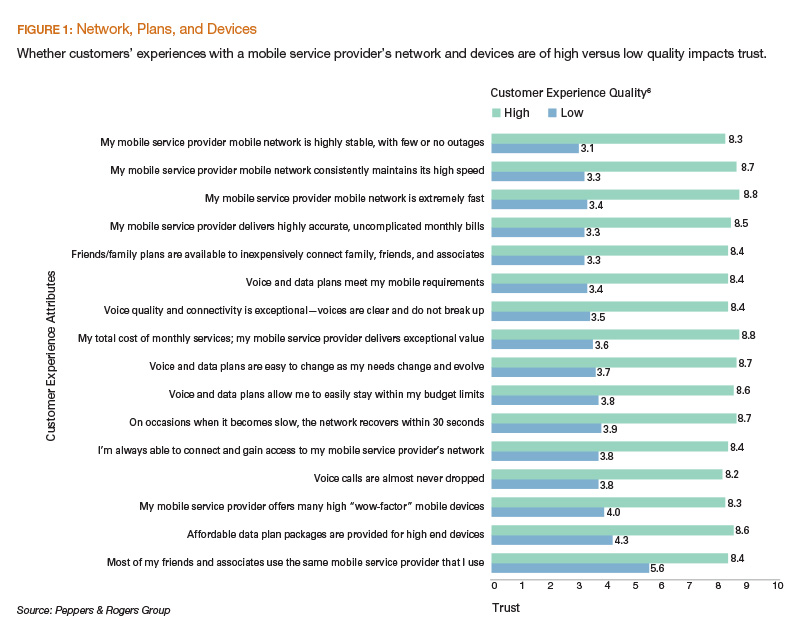
Most significant among these basics is the delivery of a stable and high-speed network, accurate and uncomplicated bills, and plans that fit the customer's needs, with trust multipliers ranging from 2.5 to 2.7. In contrast, when customers' friends and associates use the same mobile service provider, the trust multiplier drops to 1.5, suggesting that improvements in this experiential area do not yield the same degree of proportional benefit in building customers' trust.
The impact of customers' experiences with a mobile service providers' network, plans, and devices varies with the characteristics of the relationship. For example, the experience of always being able to connect to the network has a higher trust multiplier for customers whose employers pay for their mobile plans. Additionally, having calls rarely drop has a higher trust multiplier for prepaid as compared to contract customers. "These observations highlight the importance of a segmented approach to customer experience management," explains Ozan Bayulgen, partner at Peppers & Rogers Group, "since the salience of performance attributes varies for subsets of a customer base."
2. Communications to the customer
A second dimension of customers' experiences with their mobile service provider concerns the content, clarity, timeliness, and transparency of the communications they receive (see Figure 2). Communications are the voice of the company, and the manner and the message of how those communications are articulated influence customers' perception of the provider's trustworthiness.
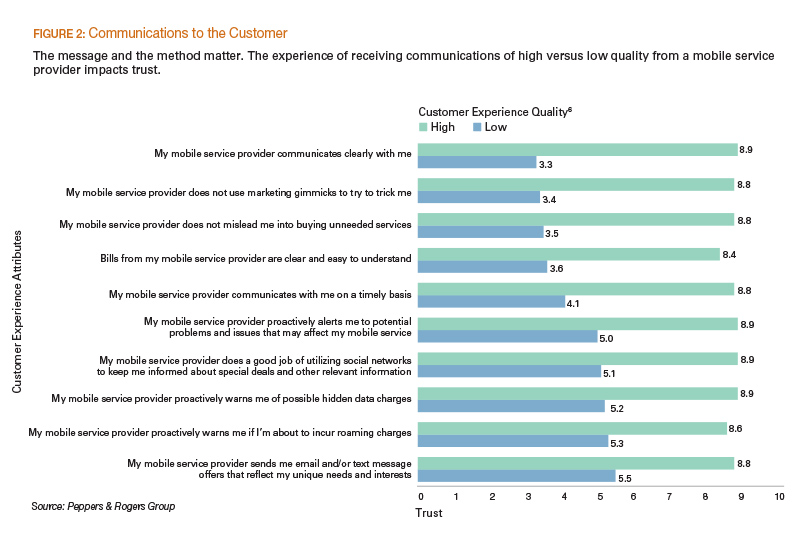
Among those experiential attributes with the highest trust multiplier is the receipt of communications that are clear—including bills. Clarity is closely related to transparency, manifested in the absence of marketing gimmicks or attempts to mislead customers, both of which diminish trust. Even though such tactics might produce a short-term gain, they do so at the risk of long-term damage to the perception of the trustworthiness of the provider.
Finally, proactivity is an important facet of communications that succeeds in building trust. Trust is commonly understood as having the best interests of another at heart and, when this is done authentically, it is inherently proactive in nature. In the realm of communications, when customers are proactively alerted to potential problems and issues that may affect mobile services, and when they are proactively warned of potential data or roaming charges, trust is enhanced. "Resolving customer problems after they have occurred builds satisfaction," notes Bayulgen. "But proactively preventing those problems builds trust."
3. Communications from the customer
Customers of mobile service providers primarily communicate through the contact center, and the quality of the experience of those contacts impacts the perceived trustworthiness of the provider (see Figure 3). To enhance trust, mobile service providers are advised to:
- Listen carefully and ask questions to ensure that the customer's concerns are understood
- Show appreciation for the customer's business
- Apologize when a mistake is made
- Be available within 30 to 60 seconds of calling
- Ask for the customer's feedback
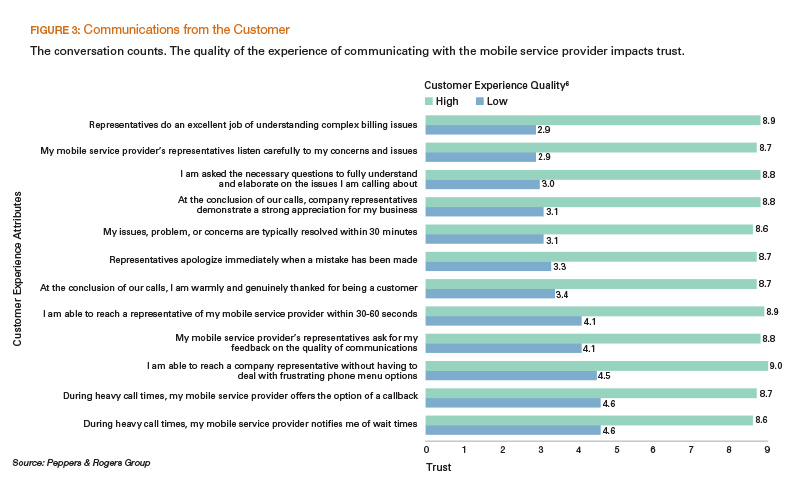
Predominately, the experiential characteristics of a customer-to-company interaction with the highest trust multipliers listed above have an interpersonal, humanistic connotation—and, in some cases, essentially require no capital investment to implement: Listening carefully and apologizing when necessary are free, but may provide a substantial trust dividend. In contrast, those experiential characteristics with a lower trust multiplier are more functional and mechanistic: avoiding frustrating phone menus, offering the option of a call back, and being notified of estimated on-hold wait times.
4. Retail stores
A fourth dimension of customers' experiences with their mobile services provider involves their retail experience (see Figure 4). Unlike interactions with the network and through company-to-customer and customer-to-company communications, in-store experiences bring a representative of the mobile services provider face-to-face with a customer. For this reason, these experiences are personal and potent, and create emotions and memories that are resilient to decay. When a mobile service provider succeeds in delivering a high-quality retail experience, trust is created—for example, by:
- Listening carefully to the customer's needs, requirements, and budget limitations
- Providing courteous and knowledgeable sales associates and managers
- Warmly and genuinely thanking the customer
- Making recommendations that reflect the customer's needs and budget, and providing easy-to-understand pricing
- Demonstrating a strong appreciation for the customer's business
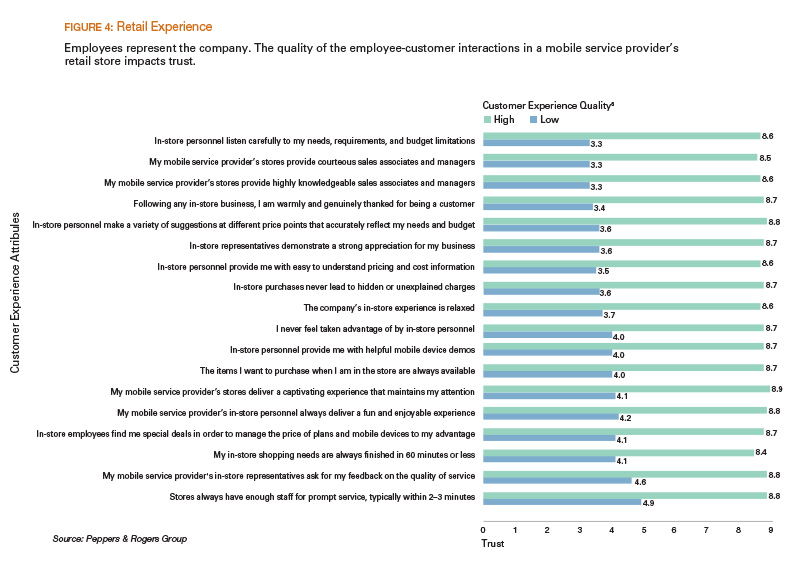
Consistent with the pattern of results observed with customers' experiences in contacting the mobile service provider, the facets of the in-store experience with the highest trust multipliers are those that have an emotional overtone—being listened to, being treated courteously, and being thanked. While important, special deals or prompt service, in contrast, have a comparatively lesser impact on the development of trust.
5. Brand
A fifth and final dimension of customers' experiences with their mobile services provider addresses the concept of brand. Brand represents the identity and personality of a mobile service provider, built over time through all of a customer's own experiences and, in today's socially connected world, also by reports of the experiences of others. Ultimately, the brand is the promise made to the customer by the mobile service provider—and how well that promise is kept influences trust (see Figure 5). Aspects of the brand with large trust multipliers include:
- Having a strong reputation for honesty and clarity, and for treating customers right
- Being proud to be associated with the mobile services provider
- Having excellent mobile network technology
- Having customers as its primary concern
- Keeping customers' interests foremost in mind Of the experiential dimensions reported, brand has the highest average trust multiplier (3.2)—more than the network, plans, and devices (2.3); more than communications to the customer (2.1); more than communications from the customer (2.1); and more than the customer's retail experience (2.3).
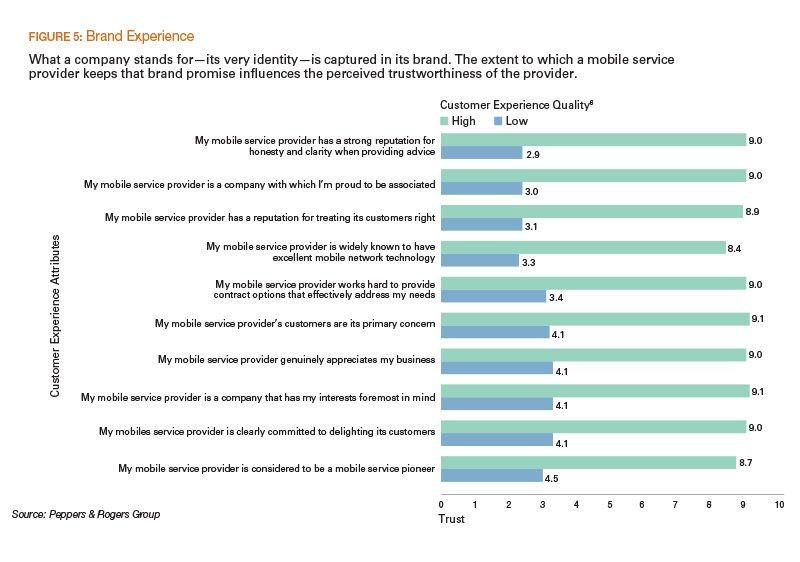
Emotions
When customers interact with a mobile service provider, the experiences are not purely objective and cognitive—they are subjective and affective, too. Experiences engender emotions,8 and emotions in turn impact the perception of the trustworthiness of the mobile services provider (see Figure 6).
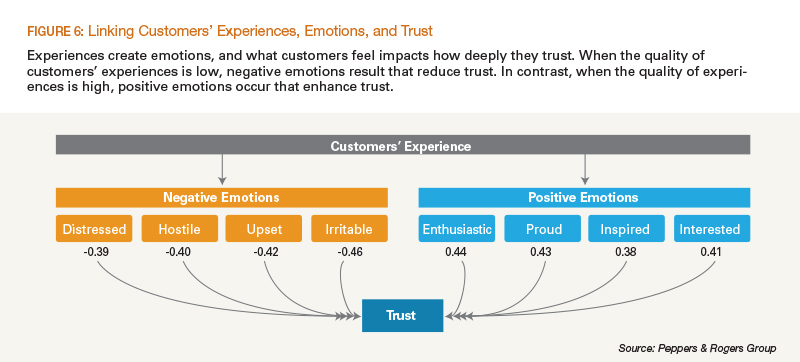
The positive emotions most strongly correlated with trust are feelings of being enthusiastic (r=0.44), proud (r=0.43), interested (r=0.41), and inspired (r=0.38).9 Each of these emotions is in turn impacted by a variety of experiences that, when they are of high quality, reinforce those emotions. For example, customers feel inspired when the mobile service provider's stores succeed in delivering a captivating experience, when the provider is perceived as having the customer's interests foremost in mind, and when the provider is clearly committed to delighting its customers. Each of these three experiences is positively correlated with being inspired (r=0.45), and being inspired is positively correlated (r=0.38) with trust.
In contrast, the negative emotions most strongly correlated with trust are feelings of being irritated (r=-0.46), upset (r=-0.42), hostile (r=-0.40), and distressed (r=-0.39). As the frequency of occurrence of these emotions increases, trust decreases—the relationship is an inverse one. Therefore, reducing these emotions through improved customer experiences is the objective. For example, the feeling of being distressed increases as the clarity and ease of understanding of bills decreases (r=-0.32), as the reputation for treating customers right is poorer (r=-0.32), and as pride in being associated with the provider is lower (r=-0.34). When these three experiences are of lower quality, then feelings of distress increase and, as distress increases, trust decreases (r=-0.39).
When customers agree that "My mobile services provider is a company with which I'm proud to be associated," that brand experience succeeds in lowering the negative emotions of being irritated, upset, hostile, and distressed—and raises the positive emotions of being enthusiastic and proud. Pride in the company is potent, and can be positively impacted by the company's purpose—the sense of mission that drives employee engagement and customers' pride. "It would be hard to conceive of a more effective mission than one centered on earning and keeping the trust of customers," write Don Peppers and Martha Rogers, Ph.D., founding partners of Peppers & Rogers Group. "Solving customer problems, making the customer's life better, delivering a product or service at a fair profit that is faster, cheaper, better fitted to the needs of the customer—these are the kinds of tasks that can infuse employees with enthusiasm." And, that passion matters: "Employee engagement is explicitly linked to customer trust...with more than half of engaged employees agreeing that 'At work, my coworkers always do what is right for our customers,' compared to just one in ten disengaged employees."10
Trust
The customer experience attributes examined in this research, when executed well, enhance customers' trust in their mobile service provider by demonstrating proficiency across several dimensions. These experiences impact the perception of the mobile services provider doing things right, because competence builds confidence in the trustworthiness of the provider. A second aspect of trust, however, addresses the complementary facet of doing the right things by having the intent or goodwill to act in customers' best interests (as opposed to the self-interest of the mobile service provider). "Both of these qualities are important if you want to be considered trustworthy; either one by itself is not sufficient," explain Peppers and Rogers. "It does a customer no good, for instance, to deal with the best-meaning company in the world if that company doesn't have enough competence to deliver the product on time or in good condition."11 The research examined several measures of the extent to which mobile service providers are perceived to be doing the right things or having goodwill toward their customers, each of which is highly correlated with trust. Chief among these statements is "My mobile services provider focuses on doing the right thing for its customers" (r=0.82), a finding consistent with the definition of the construct of goodwill. Other attributes of the mobile service provider that engender goodwill are:
- Working hard to be fair in its dealings with customers (r=0.82)
- Demonstrating truthfulness and a high level of believability (r=0.82)
- Having a strong reputation for honesty and openness with its customers (r=0.81)
- Demonstrating a strong desire to work with customers in good faith (r=0.81)
- Not hesitating to recommend what is best for the customer (r=0.76) Trust takes time to develop. New subscribers, with tenure of less than two years, rate the trustworthiness of their mobile services provider at 6.4.7 In contrast, those customers who have been subscribers for six or more years rate it at 7.3. This pattern is more pronounced for customers who pay for their own mobile phone plan versus customers where the employer pays for the service in whole or in part, suggesting that a personal financial commitment to the provider influences the development of trust.
Customers' level of expertise also impacts their rating of the trustworthiness of their mobile service provider. Customers who describe their mobile expertise as being at the beginner level rate the trustworthiness of their mobile services provider at 6.3; those at an average level, 7.0; and those at an expert level, 7.4.7 Since trust increases with expertise, mobile service providers may be well-served to proactively educate their customers to more fully understand and use the features and functions of their mobile device to accelerate the development of proficiency.
Business Outcomes
There are business benefits to enhancing the customer experiences that enhance trust. When asked how much they directly value a high level of trustworthiness in their mobile services provider, research participants report a willingness to pay an average of $11 more per month for a provider with a high level of trustworthiness. "This finding, when multiplied by millions of customers, represents a significant business opportunity and helps to build the business case for investing in customers' trust," Bayulgen explains.
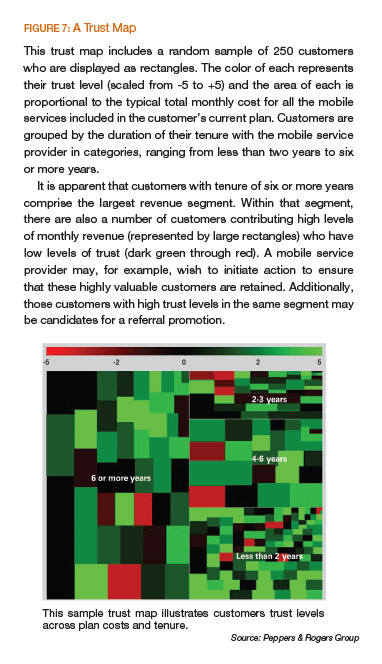
Beyond this price premium for trust, there are additional rewards for delivering experiences that create trust, including improvements in commitment, loyalty, and advocacy.
1. Commitment:
Commitment reflects an attitudinal bond between a customer and a company. It involves feelings of belonging and a sense of psychological attachment, and has been defined as "an enduring desire to maintain a valued relationship."12 There are strong correlations between trust in a mobile service provider and respondents' ratings of statements that measure commitment. For example, as trust in a mobile service provider increases, so too do levels of agreement with these statements: "I am fully committed to my current relationship with my mobile service provider" (r=0.69) and "I feel a strong attachment to my mobile service provider" (r=0.64). In both cases, the mean rating of those who trust the mobile service provider is 1.9 times greater than those who distrust the company.13 This same pattern of results even appears for the bold statement, "My relationship with my current mobile services provider is strong enough that I would mourn its loss" (r=0.56). Companies that succeed in establishing this level of attachment and affection are competing on the basis of "share-of-heart," and have been shown to significantly outperform the S&P 500.14
2. Loyalty:
The link between customers' loyalty and the long-term profitability of a business is well established, and achieving loyalty is especially significant in a mature market such as mobile services in the United States. Loyalty refers to the anticipated longevity and fidelity of the relationship, and is reflected by a customer's favorable propensity toward (and patronage of) a company.
A driver of loyalty is trust, evidenced by the strong correlation between the two. Customers who trust their mobile services provider (versus those who are distrustful) report that they are substantially more likely to be loyal, with mean ratings that are at least 1.7 times higher than statements representing:13
- Longevity: "I anticipate that I will remain a customer of my mobile provider for a long time" (r=0.71) • Preference: "I prefer my mobile services provider to all of its competitors" (r=0.70)
- Switching: "I seldom, if ever, consider switching to a different mobile services provider" (r=0.63)
- Price: "Although all or some of the competition may be cheaper, I will pay a higher price to stay with my current mobile services provider" (r=0.55) These facets of loyalty are critical to success in the highly competitive mobile services market and are correlated with customers' trust.
3. Advocacy:
More trusted than advertising on television or in magazines or newspapers are recommendations from personal acquaintances or opinions and reviews posted by consumers online.15 What people say about a company—and how intensely they are willing to say it—is a powerful form of marketing, and both increase as customers' level of trust in their mobile service provider grows.
Research participants who trust their mobile service provider rate the following statements 1.9 times higher than those who are distrusting:13
- Recommendation. "I recommend my current mobile service provider without hesitation" (r=0.74)
- Advocacy. "I proactively praise my mobile service provider in any discussions related to mobile services and the market's set of competitors" (r=0.64)
- Defense. "I defend my mobile service provider when others question its commitment to its customers" (r=0.67) Seizing the Opportunity
Having a strategic focus on customers' trust as a new path to achieving competitive differentiation and sustained success represents a significant opportunity. Mobile services providers that choose to seize that opportunity will have a trust asset that pays substantial dividends: enhanced commitment to, loyalty toward, and advocacy of the company.
When a storm is on the horizon, navigation is more important than battening down the hatches. Choose the right course, and steer well.
Footnotes
1. United States Telecommunications Report, Q1 2012. Business Monitor International.
2. Wireless Telecommunication Services in the United States. Datamonitor, 2011.
3. Mobile Operator Metrics. Pyramid Research, 2011.
4. (2011) Don't Tell Me They Can't Give You a Free Phone. Retrieved February 20, 2012, from: http://www.billpolice.com/wireless-devices/cant-get-a-free-phone.
5. The research insights described in this article are based on an analysis of responses from 2,416 adult customers of AT&T, Sprint, T-Mobile, US Cellular, or Verizon in the U.S. to an online questionnaire in June 2011. These respondents were 44 percent male, and 56 percent female and encompassed all age ranges (18-34, 10 percent; 31-42, 25 percent; 43-54, 28 percent; 55-66, 23 percent; 67+, 14 percent); income brackets ($24K or less, 10 percent; $25K-$49K, 26 percent; $50K-$74K, 24 percent; $75K-99K, 18 percent; $100K+, 22 percent); marital states (single, 37 percent; married, 63 percent); and included households with (30 percent) and without (70 percent) children.
6. The quality of customers' experiences is measured through their rating of a performance attribute on a scale ranging from "strongly disagree" (1) to "strongly agree" (7), with the bottom two scale points (1-2) representing "low" performance by the mobile services provider and the top two scale points (6-7) representing "high" performance.
7. Trust is measured by the respondent's rating of the item, "My mobile services provider can be trusted" on a scale ranging from "strongly disagree" (0) to "strongly agree" (10).
8. Lacki, T. (2011) Get in Touch With Your Customers' Emotions. Customer Strategist, 3(1), 42-46.
9. Emotions were measured by the respondent's rating of the itme "When interacting with my mobile services provider, I experience the following emotions or feelings..." on a scale of "not at all" (1), "a little" (2), "moderately" (3), "quite a bit" (4), and "extremely" (5), based on: Watson, D., Clark, L. A. and Tellegan, A. (1988) Development and Validation of Brief Measures of Positive and Negative Affect: The PANAS Scales. Journal of Personality and Social Psychology, 54(6), 1063-1070.
10. Peppers, D., and Rogers, M. (2008) Rules to Break & Laws to Follow: How Your Business Can Beat the Crisis of Short-Termism. Hoboken, NJ: John Wiley & Sons.
11. Peppers, D., and Rogers, M. (2012) Extreme Trust: Honesty as a Competitive Advantage. New York: Penguin.
12. Moorman, C., Zaltman, G., and Deshpande, R. (1992) Relationships between Providers and Users of Market Research: The Dynamics of Trust within and between Organizations. Journal of Marketing Research, 29(3), 314-328.
13. "Trusters" are defined as respondents with trust ratings of 9-10, while "distrusters" are respondents with ratings of 0-6 (see endnote 7).
14. Sisodia, R. S., Wolfe, D. B., and Sheth, J. N. (2007) Firms of Endearment: How World-Class Companies Profit From Passion and Purpose. Upper Saddle River, N.J.: Wharton School Publishing.
15. Global Advertising: Consumers Trust Real Friends and Virtual Strangers the Most, 2009. Retrieved February 28, 2011, from: http://blog.nielsen.com/nielsenwire/consumer/global-advertising-consumers-trust-real-friends-and-virtual-strangers-the-most.

